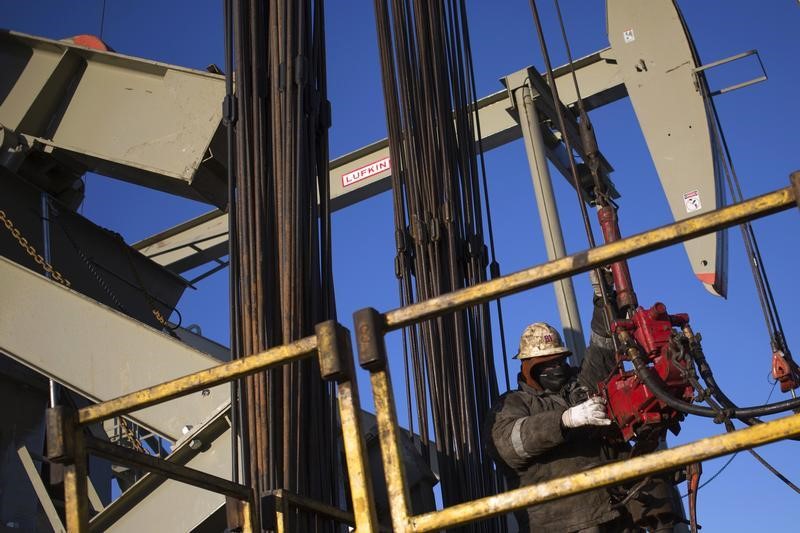* New fields to add 3 mln bpd of oil in 2016 - Rystad
* More than $220 bln of projects scrapped since 2014
* New production to delay market rebalancing
By Ron Bousso
LONDON, Feb 18 (Reuters) - As oil firms scrap dozens of
billions worth of mega projects essential for supplies in
decades ahead, fresh output from huge fields already being
developed is set to weigh for many more months on an oil market
struggling to shake off a glut.
A collapse in oil prices over the past 20 months to below
$30 a barrel has taken a heavy toll on production around the
world, reversing spectacular growth in U.S. shale oil and
halting plans to develop costly and complex fields deep in
oceans or treacherous seas such as the Alaska Arctic.
But companies that have been investing often more than $10
billion in projects that were approved in the first half of the
decade, when oil fetched in excess of $100 a barrel, are pushing
ahead with many of their developments.
These include the TEN field off the coast of Ghana, operated
by British company Tullow Oil TLW.L , which is set to start
production in the middle of this year, expansions at Chevron (N:CVX)'s
CVX.N Jack/St Malo field in the Gulf of Mexico and at Cenovus'
CVE.TO Foster Creek oil-sands field in Canada.
Around 3 million barrels per day (bpd) of oil production is
set to come on stream in 2016 from projects whose development
started as early as 2013, according to Oslo-based consultancy
Rystad Energy.
These projects will add a further 1.5 million bpd in 2017,
with around two-thirds of the production coming from offshore
developments.
'SELFISH'
Patrick Pouyanne, chief executive of French oil major Total
TOTF.PA , was unapologetic about boosting his production by
more than 9 percent this year even as the world faces a huge
production overhang.
"We are all still investing in projects we decided in
2012-2013 and 2014. These projects will be put in production in
2016, 2017 and still 2018," Pouyanne said last week at the
International Petroleum Week conference in London.
"I am not sure we participated in the stabilisation of the
market, but you know, there is only one good reaction when you
face a crisis, that is to be selfish and produce as much cash as
you can."
Total in recent years began production from the CLOV field
off Angola's coast, in which BP BP.L , Statoil STL.OL and
Exxon Mobil (N:XOM) XOM.N are partners. It is on track to launch the
ultra-deepwater Kaombo project, also in Angola, in 2017.
In January, Anadarko APC.N started production from its
Heidelberg project in the Gulf of Mexico which was discovered in
2009 and started development three years later.
The U.S. Energy Information Administration expects
production in the Gulf of Mexico to rise from 1.5 million bpd in
2015 to 1.8 million bpd in 2017, offsetting some of the declines
in shale oil production.
The ramp-up of production from projects is equally vital for
the host nations, particularly economies that depend heavily on
oil revenue such as Angola, Nigeria or Mexico, where national
oil companies are partners in the developments.
The vast majority of the world's projects of over $1 billion
are formed by joint ventures between international and national
oil companies, according to data from consultancy EY.
CORRECTION UNDER WAY
With more than $220 billion of oil and gas projects
cancelled or put on hold since the start of oil's price decline
and companies slashing spending plans, a correction in global
supplies is under way, Rystad Energy head of analysis Per Magnus
Nysveen told Reuters.
Production from mature fields is nevertheless set to decline
by around 3 million bpd this year due to natural field decline
and lower investment.
"Behind the scenes there is a lot of correction going on
because old producing fields are declining faster than they used
to because there is less drilling," Nysveen said.
Global oil production is expected to align with demand
towards the year-end as U.S. shale output declines, even though
the world will continue to store unwanted barrels for the rest
of 2016, the International Energy Agency says.
That means the rebalancing is taking far longer than most
OPEC members had anticipated when the exporter group's leader
pushed through a strategy in late 2014 to maximize output and
drive higher-cost producers out of the market.
New production is likely to delay the rebalancing further,
analysts at U.S.-based investment bank Evercore said.
"While ultimately lower upstream (oil production) capital
will drive lower aggregate supply, evidence suggests the
balancing point is shifting to the right," Evercore said.
This sets "a challenging environment for the market to
question the sustainability of demand trends, and (is) likely a
reflection of today's market reality, in our view".
<^^^^^^^^^^^^^^^^^^^^^^^^^^^^^^^^^^^^^^^^^^^^^^^^^^^^^^^^^^^
GRAPHIC: Oil Production Growth http://reut.rs/1PHQxXI
^^^^^^^^^^^^^^^^^^^^^^^^^^^^^^^^^^^^^^^^^^^^^^^^^^^^^^^^^^^>
